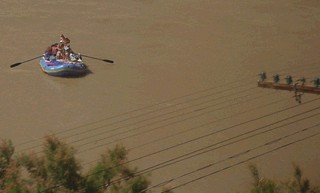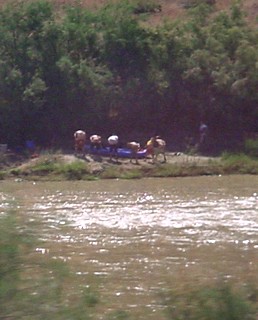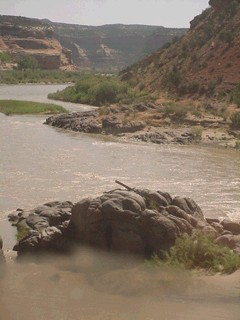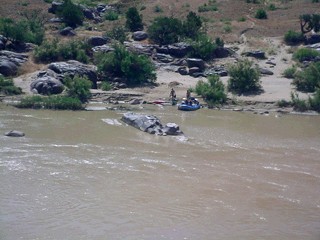Nick, age 14, and his Grandmother were on their own 'little adventure,'
as she called their trip from Chicago to San Francisco and back. We
enjoyed lunch with them after leaving Sacramento at 11:35 a.m. Her
car attendant has said, on their way out to California, that there were
54 tunnels between Denver and Sacramento and she and Sue were trying to
count them during lunch to see if he was correct.
We had arrived in Sacramento on the Coast Starlight about 12:20
a.m., and caught a taxi to our near-by Vagabond Inn accommodations the
previous evening. The two-block taxi ride was $5 and worth it
to have our two heavy bags transported for us. The Vagabond Inn
has a shuttle, but it doesn't pick up anyone after 11 pm and the Coast
Starlight is not scheduled to arrive until midnight. We planned
on taking it back to the station the next morning, but it was being used
to go to Home Depot, so they ordered us a taxi at their expense. Many
freights, one being an auto carrier, and Calfiornia Amtraks go through
Sacramento Station.
We waited in Sunny California weather for the 11:35 California Zephyr
and upon boarding car 0632, found that we were again adjacent to the diner.
|
|
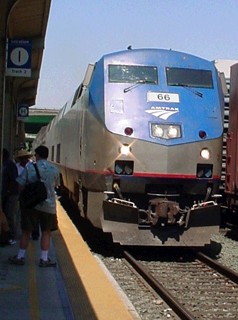
California Zephyr Arrives.
|
In our deluxe bedroom "E" was a photo copy of an original color
Route Guide showing all cities between San Francisco and Chicago. It
said,
SACRAMENTO Home of the California State Railroad Museum--one
of the nation's most impressing displays of railroad equipment. The
capital of California was the western terminus for the Pony Express in
1860. It was also the starting point for the Central Pacific Railroad
in 1863.
At Roseville, CA, the J.R. Davis UP yards caught my attention
with the re-numbered older SP deisels. Under the cab windows a
UP name and number plate had been riveted over the old SP number,
yet the faded 'Southern Pacific' white lettering was still evident on
the black engine's sides. Even more interesting was the siting of
two red-bladed snow removal rotaries that we saw from our dining table
while stopped in Roseville.
East of Roseville, we began a long winding climb first through
brown, dry grass-covered hills with California oaks, followed by red soil
and pine trees. Eventually the soil turned lighter, more rocky, with
a multitude of various species of conifers. The track was ribbon
rail (1/4 mile single rails welded together eliminating the clackety-clack
except at crossings and siding switches. We traveled on double track
with mixed freights coming downhill on the adjacent track containing much
lumber, some from British Columbia, and at least one coal train. Beautiful
cloudless, blue sky above the deep green pines.
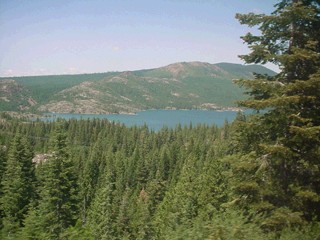
High altitude California lake in the Sierras.
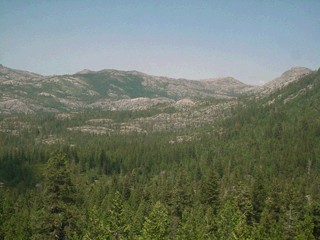
|
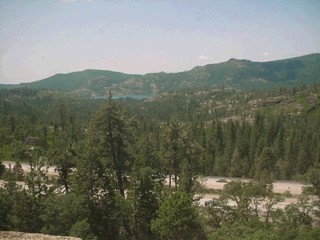
I-80 parallels our track over
Donner Pass and into Nevada
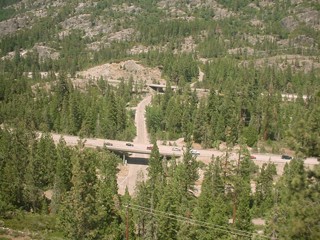
|
Our car attendant, Robert Mancini, pointed out the American River
far below the track on the south side of the train. He mentioned
that there was usually an interpretive speaker from the RR Museum, but
not today...shucks!
Our Car Attendant, Robert, pointed out the snow sheds which used to
be wood, but which are now concrete, to keep the 30 foot deep snow off
the tracks. Interstate 80 crossed the tracks many times.
Four-mile tunnel, 50 degrees in all tunnels and caves.
On the curves, I noticed we have 2 engines and at the end, 4 express
cars and a private car. I mentioned the private car to Robert,
and after the Moffatt Tunnel he had left the following facts in our compartment
from an official document. The car was the Silver Iris #800285,
owned by Robert M. Klein, 775-851-7245. It was to be added to Train
5 (California Zephyr) at the rear with the Iris' vestibule to the rear.
It was to run on generator. Water car will provide with wet
ice before departure. Passengers will travel from origin to destination.
The notes said UPRR will add car in Sparks to rear of consist,
yet a later note on the page said UPRR will remove car at Sparks. Perhaps
it was a round trip from Sparks to Sacramento or farther west, then returned
to Sparks. The total Revenue was $1,417.70 and Transportation Mileage
was $549.70.
Through announcements, I learned that we have 2 sleeping cars
in the front and one in the back. An interesting Consist that
I recorded in Sparks as:
Engines 72 and 66, Mail car 1754, Transition Sleeper 39016, Sleeping
Cars 32028, 31209 (South Dakota), Diner 38042, Sightseeing Lounge 33007,
Coaches 34006, 34124, 34072, and 32077 plus 4 express cars then the private
car.
At 3:15 p.m., we passed the westbound California Zephyr and our
attendant mentioned that they were seven hours late, as both trains stopped
and something was passed from one to the other.
We passed Stanford Curve where you can see both the engines and
last car...much like the curve north of the San Luis Obispo Station, in
California.
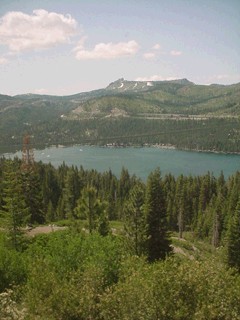
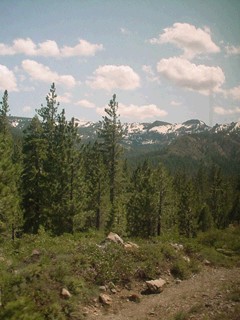
Robert pointed out "Indian snow...Apache here, Apache there!"
All the wood snow sheds, a constant fire hazard during the
steam engine days, have been replaced with concrete snowsheds. Recently
a grain train derailed partially inside one and you could see missing
side and roof spots as the end of our train passed through.
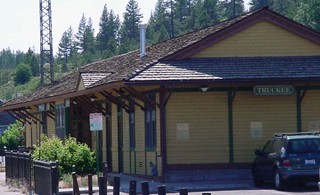
Truckee, California, Station
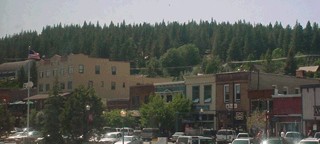
|

Downtown

and Snow Rotary
We had seen rotaries earlier in Roseville.
|
We leave California and enter Nevada.
The Route Guide also says, RENO Known as the "Biggest
Little City in the World," Reno began as a quiet rail stop and later became
a boom town. The city fathers legalized prize-fights, hosting Jim
Jeffries vs. Jack Johnson fight in 1910. Gambling was legalized in
1931.
Robert says that Reno is so hot they can see Sparks (NV)
where we will stay at the Nugget Hotel in August for the 5,000-car Hot
August Nights car show. Robert had an interest in Classic Cars also
so I gave him a post card sample that my friend and I will use on our "Coast
to Coast, Border to Border" trip in Spring 2004, driving our '55 and
'56 Chevys
The Trukee River and Interstate 80 and the railroad all three travel
together from Trukee to Reno. Nice scenery...rushing river rapids,
green trees along the banks, with an occasional fisherman.
After dropping from Truckee, California, to the desert prior to
Reno, Nevada, we lose all trees for sand and scrub brush as our scenery.
We enjoyed dinner with a couple from New York (retired social workers)
who had taken the train down the east coast to Jacksonville, FL, then
across to California for their daughter's graduation from UCLA. Now
they had gone up the California coast to Sacramento, as we had done, and
boarded the California Zephyr for their trip back to New York. We
watched the desert sunset from our dinner table, since we were there for
2 hours:
Sunday, June 22, 2003
Up at 7:30 for shave and shower and breakfast with a couple from
Vancouver Island, British Columbia, Canada, after a reasonably sleep-filled
night in our 'deluxe' bedroom. Deluxe bedroom really means a 2/3
car width room with couch which makes into a twin bed, a narrow upper berth,
a sink and mirror, chair and airplane sized bathroom that includes a shower.
Anthony was our server. This was his first California Zephyr
trip from Chicago, his home base, to Oakland and back. Other routes
out of Chicago go to Dallas and Seattle. He was working for Amtrak
after finding the job on the Internet and receiving training. He had
worked 4 1/2 years as a flight attendant for United, but was 'furloughed.'
He hopes to be hired back after this summer job with Amtrak. I
notice at breakfast that the private car was lo longer with us.
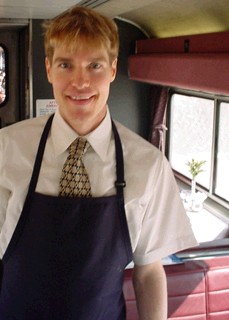
There is about 1,000 miles of desert from Reno, Nevada, through
Utah to Grand Junction, CO with what appeared to be one resident per
mile. The engines we passed now were BNSF with mixed freight and auto
carriers or finely ground coal. The eroding mesas on the north side
of the track are the Book Cliffs.
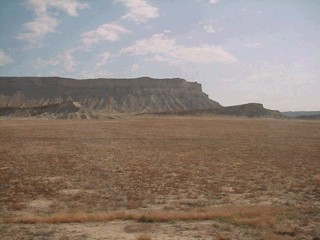
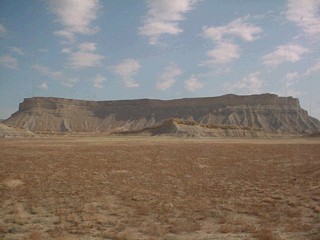
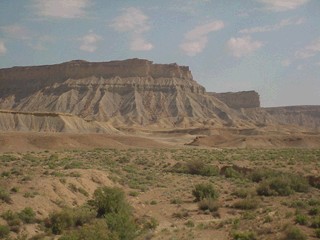
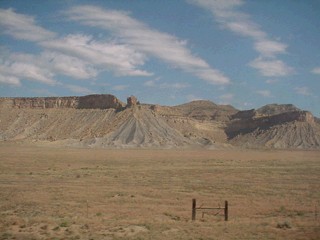
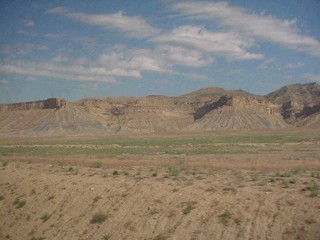
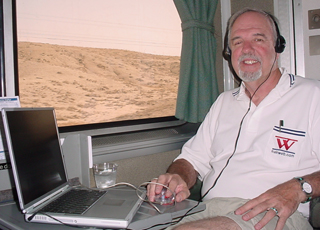
Plenty of desert viewing between breakfast and dinner and
time for travelogue writing and picture processing to some tunes I'd
copied to my computer.
Robert announced we'd soon see the Colorado River and Ruby Canyon.
The NV/CO border is marked on the side of the red sandstone wall
and an announcement was made to turn our watches back one hour from Pacific
to Mountain time..
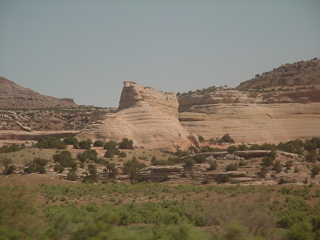
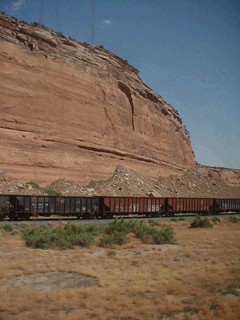
There were many river rafters in the muddy summer Colorado
River waters and all presented us their version of "Moon River."
Grand Junction was long announced as a place one could buy cherries
and grapes as well as dinasaur bones, books, soft drinks, cigarettes
and souvenirs. I bought a 'golden spike' with a miniature train
on it for $15.
The Route Guide says,
GRAND JUNCTION The Gunnison and Colorado
Rivers meet here. Grand Junction is the gateway to Mesa Verde national
Park, the Colorado National Monument and Grand Mesa National Forest.
|
|
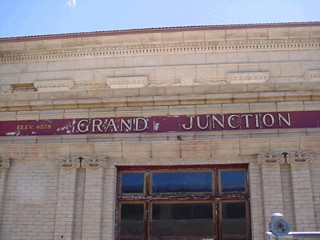
Old train station sign.
|
|
|
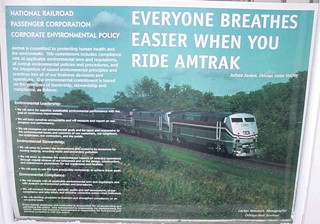
Old Amtrak poster (left) and current one ( above)
in Grand Junction Lobby
|
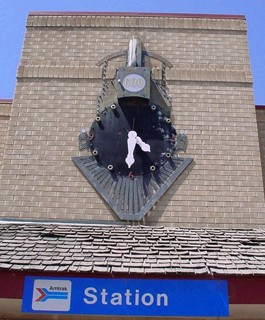
Unique clock outside
Grand Junction Station.
|
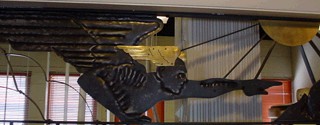
The "Zephyr" in the lobby
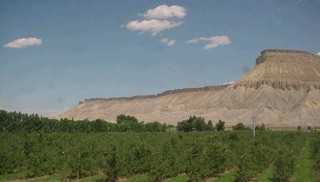
Mesa east of Grand Junction
with cherry trees in foreground.
|
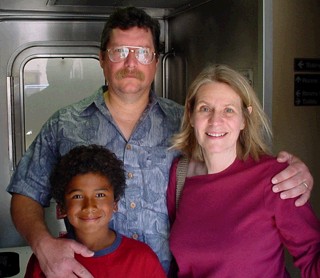
Other passengers were enjoying the scenery as well.
|
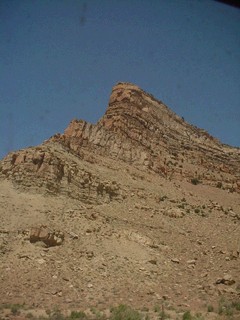
Some hills took on their own personalities,
we called this one Craggy Cliff, see his
eyes and nose?
|
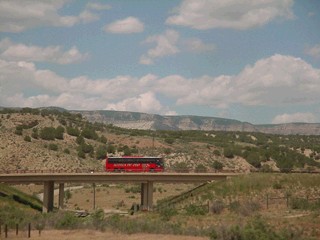
A red bus Azteca De Oro
from L.A. to El Paso
streaks through the desert.
|
|
|
|
Glenwood Hot Springs, Colorado
|
The Route Guide says, GLENWOOD SPRINGS
Roaring Fork River meets the Colorado on the right. The infamous
gunslinger Doc Holilday is buried here. Blenwood Springs was also
a favorite of Teddy Roosevelt, who stayed at the Colorado Hotel and enjoyed
the revitalizing waters of the Yampa Hot Springs.
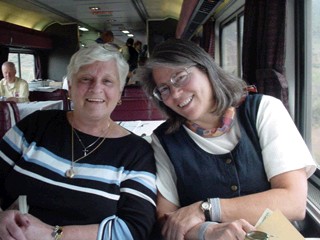
Lunch was with Donna (Left) and Oneta (Right)
which started at Glenwood Springs stop.
|
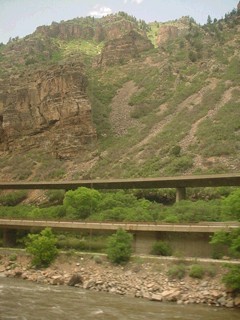
Donna pointed out the bike trail
along I-70.
|
Sue skipped lunch and enjoyed the cherries and grapes ($5 for both)
that I had bought at the Grand Junction stop. Grand Junction also
has nectarines and peaches in their season. I had the cheese
burger and Pinot Grigio wine from Trento, Italy, nice flavor, not
quite as sweet as Zinfandel. Donna is a cafeteria manager in DeMoines,
Iowa, and talked of how proud she was of her program. She related
how she and the staff join school convocations and do the mashed potato
dance! Oneta works for a railroad engine manufacturer and lives in
Dowers Grove, Illinois. Oneta is traveling with her mother and both she
and Donna are traveling in coach.
During lunch I took several pictures of the rafters and kyakers
in the river, I-70 which cost millions per mile to construct in it's
bi-level configuration, and accompanying bike trail. All this along
with the railroad pretty much fills the canyon with summer activities.
The Route Guide says,
GRANBY This station is the gateway to
Rocky Mountain National Park. The vast meadowlands in this area
make up a region called Middle Park. Evidence of aboriginal people
has been found at nearby Windy Gap Dam dated at 3000 B.C. -1200 A.D., predating
American Indians. Silver Creek ski area and Winter Park are across
the valley to the right.
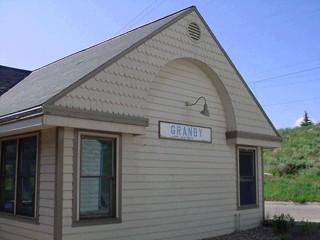
The Granby, CO, stop was a smoke stop. The mother (right)
was accompanying her son to a dwarf convention and
had him practice "Amazing Grace" on his pocket trumpet
again as she had at Grand Junction. I asked if he had made
any tips and he proudly showed me a $1 bill.
|
|
|
|
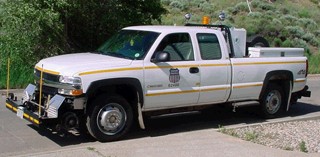
UP seems to have new section crew trucks.
|
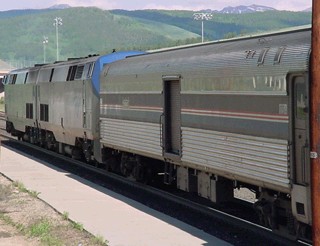
"All Aboard!"
|
|
At 5 p.m. dinner, with waiter Lee B. Morris, who continued to
deliver meals, drinks, and desserts with no idea who got which items,
we sat with Lynn and Jill, retirees from Cal State Long Beach and Anaheim
City Schools respectively. Lynn had been in charge of Distance
Learning and Adult Education and Jill in charge of Educational Technology.
They now live in Sun City/Lake Tahoe and have a home in Roseville,
California.
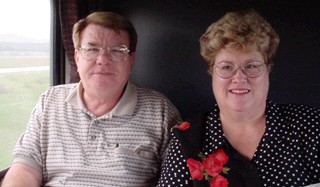
During dinner we passed Winter Park (Fraser) Station. The
Route Guide said, This is the station for the nearby Winter Park Ski
REsort. The Fraser River cuts a swath trhough Arapahoe National Forest
and Fraser Canyon. The town of Fraser proudly calls itself the "Icebox
of America" because of its winter temperatures of -50 degrees F. The
Devil's Thumb is a rock formation on top of the ridge to the north.
Right at the end of dinner, we entered the 6.2 mile Moffat Tunnel
and were instructed not to pass between cars to avoid diesel fumes entering
the cars.
As we were went down the eastern slope of the Rockies toward Denver,
we passed empty coal car train of 106 cars with both puller engines and
2 pusher engines (above).
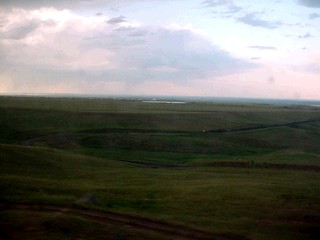
Coming down the eastern slope, we could see from Boulder to Denver
and as far as 1/3 of Colorado.
DENVER,says the Route Guide, is The Mile High
City and is breathtaking to behold, and the Amtrak station is in the midst
of it all. You'll be within walking distance of Coors Field, restaurants
and hotels in this vibrant downtown area.
Our arrival in Denver was only 1 1/2 hours late. ( I say
only, wait until you read the next chapter!) Long-time
friend Larry picked us up and drove us to his home in Aurora, CO.
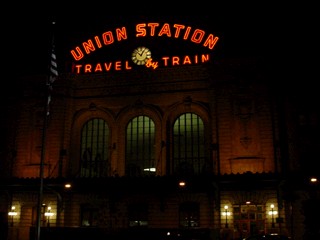
Click "California Zephyr Denver to Chicago" below to see why the clock
on the Denver Station above says 12:50 A.M.!










